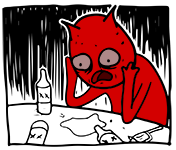Cael
Arcane

- Joined
- Nov 1, 2017
- Messages
- 22,041
This is extremely true. In Ultima, you don't talk through your actions. You just did it and the world reacts accordingly (generally via karma meter or instantly spawning guards). In modern RPGs, you get to choose Good/Evil options in a dialogue and gain alignment points that way. What the hell?The writing in Planescape is great because it's pulp. Games have a better chance of achieving greatness and significance by emulating Robert E Howard or Edgar Rice Burroughs than they do by aspiring to, I dunno, Fitzgerald or Joyce.
Really tho, the solution is less writing. RPGs would be better off copying the word count in something like Ultima V than obsessing over complex dialogue trees and "deep resonant themes." Dialogue isn't the end all be all. It should be balanced and work in concert with all the other parts of a game. A game is never gonna be great literature. Cause it's a game, not a book.
Ernest Hemingway once said, “Poor Faulkner. Does he really think big emotions come from big words? He thinks I don’t know the ten-dollar words. I know them all right. But there are older and simpler and better words, and those are the ones I use.”
RPGs should maybe aim for simpler and better.
That is something that the modern RPG lost, and I don't think people even realise it. They talk about decline and crap like that (with referrence to story, not game UI or the like), but have they really defined it? I don't think so, because I think they don't even know what is missing. They just know something isn't there.
Honestly, just take a look at the word count of Ultima 6, Ultima 7, Ultima Underworld and Worlds of Ultima. Compare that with TTON, PoE, etc. Ultima works. The rest doesn't. Why?










 I just have to express my admiration for this rather poetic post (2 references that actually make sense in 2 sentences) in a post myself.
I just have to express my admiration for this rather poetic post (2 references that actually make sense in 2 sentences) in a post myself.













